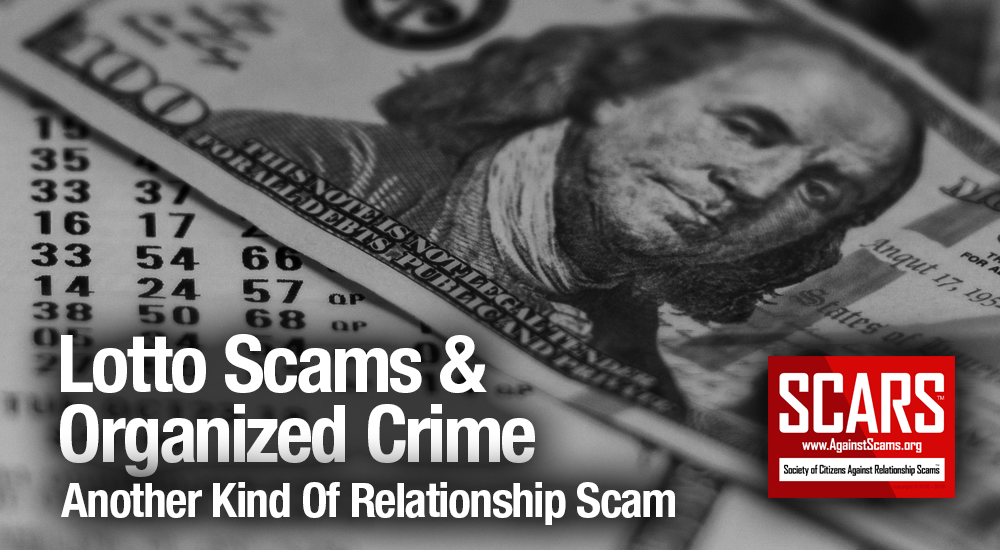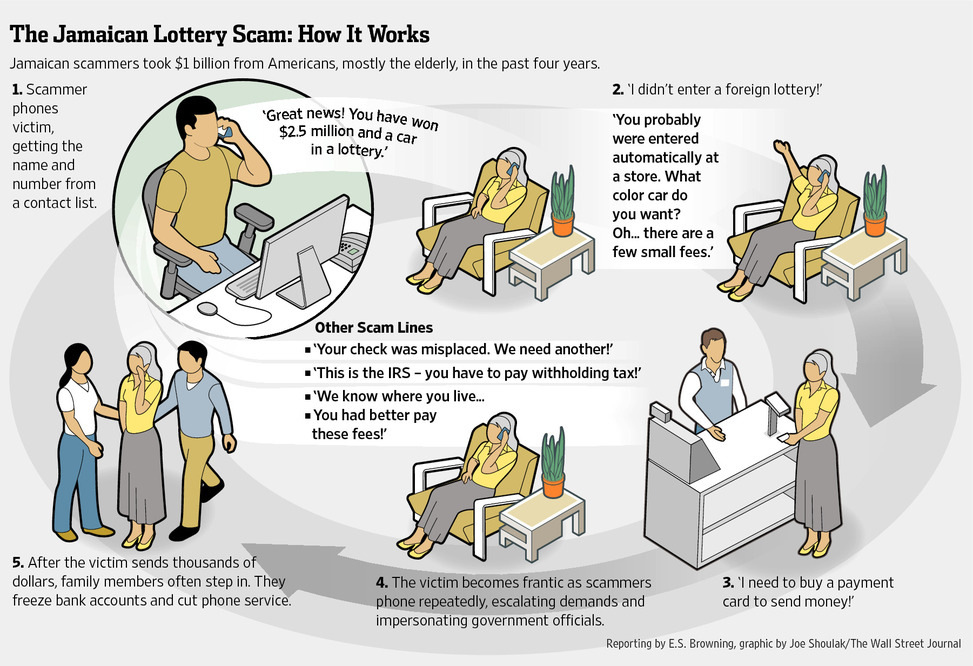SCARS™ Special Report: Deciphering the Lottery Scam Rings
Another Kind Of Relationship Scam
In Recent Years There Has Been A Shocking Increase In Jamaica’S Homicide Rate That Has Refocused Attention On Lottery Scams In The Caribbean Island Nation
But it is not a uniquely Jamaican problem, with well-organized lottery frauds operating throughout the Americas, costing the United States hundreds of millions or even billions of dollars each year.
The total number of killings in Jamaica jumped to 1,192 in 2015, a 20 percent increase from the previous year with the majority believed to be gang-related (last year data is available). Authorities point to violence between lottery scam rings fighting over profits and valuable “leads” or contact lists as the major cause of the spike. This type of advance fee fraud usually targets elderly Americans, Canadians, and English speaking victims worldwide but also fuels gang warfare in the origin country as rival scam rings compete for resources.
To give just one example, the massacre of six family members in Kingston in October 2015 was linked directly to lottery scam rings. Jamaica’s National Security Minister, Peter Bunting, said at the time that this “heinous crime shows that scamming not only affects those who participate and directly profit from it but those who associate with them,” reported Fox News.
Is It Cultural?
According to the Jamaica Observer, in an article by Donna P Hope, Ph.D.
[icon name=”quote-left” class=”” unprefixed_class=”” size=”48px”]
The first time I ever came in contact with any form of scamming was during one of my infrequent trips to New York, USA, in the early 1990s. Some of my friends had migrated — or run off — to the US and were figuring out their immigration status while hustling away in Brooklyn or The Bronx. One such friend explained that a planned shopping trip was imminent because of “a new credit card” that had been acquired from “the credit card guy” for US$50 with a spending limit of US$500. I did not understand.
Back then ordinary Jamaicans did not have credit cards. We saw them in movies and marvelled at how ‘rich’ these people were that they could simply run a card and buy anything they needed. My friend explained that this new credit card was part of an underground industry in which individuals would purchase credit cards and use them to acquire various niceties at the expense of others. I was horrified. How could you? Isn’t that stealing? I was informed that this wasn’t something bad, it was really about taking funds from those who had too much; for example, one of those “rich, old white women up North”. “But if I migrate to the US I would eventually have cards just like those,” I insisted. “You could be stealing from me!” The thought had never crossed my friend’s mind.
Today, credit cards, digital money, the Internet, and other related technologies are commonplace and credit card and lottery scamming are also part and parcel of the Jamaican reality. Jamaica has made headlines, news stories, and various features locally and internationally as the home of lottery scamming. Western Jamaica has been made notorious for lottery-scamming activities. But what exactly is at the heart of this explosion in lottery scamming and its close sibling, credit card scamming? Is it really true that dancehall is the cause, as a former minister of national security suggested to a group of Canadian-Jamaicans several years ago?
Lottery scamming is a close relative to other forms of con artistry and trickery that is based on the psychology of persuasion. The con artist uses a variety of strategies to gain the confidence of the target and persuade them to engage in specific actions. Often there are specific triggers that are selected based on the con artist’s understanding of the desires and/or interests of that individual. If successful, the con artist can exert his/her influence over the target and manipulate their responses and behaviour.
Lotto scammers can be likened to skilled marketers who are able to persuade individuals to part with their money for the promise of some benefit. The rise of the early business process outsourcing firms in western Jamaica, in particular the call centres, coupled with increased democratic expansion of Jamaica’s telephone networks, served as catalysts for the development of this sophisticated criminal network on the back of supportive historical, cultural, and social facets that already existed.
A key historical underpinning is the celebration of Anancy as an important figure in Jamaican history and culture. I have never been fond of him because all the stories I heard about Anancy were of his use of trickery to steal from his wife, children and friends. Every time I related an Anancy story I would lodge a caveat about these activities. Whatever happened to him along the Middle Passage, Anancy came to Jamaica from Africa as a con man. That trickster ethos, sometimes couched as a type of Robin Hood behaviour where you rob from the rich to give to the poor, continues to be celebrated in Jamaica. Its connection to capitalist-induced greed in this era means that the trickster imperative is socially supported, even though theft is a criminal act.
Another important cultural facet is the fact that Jamaicans are lyrical geniuses. The politician, pastor and artistes are three prominent forms of male identity whose popularity and prowess in Jamaica are based first on their use of words to connect with their audience, win their support, and convince them to engage in an activity of some sort. Indeed, ordinary Jamaican men are renowned for using only their lyrics to win a love interest, and stories abound about those who wrote letters and won the hearts of women in distant countries. Today, the telephone, Internet, WhatsApp, and other forms of social media provide unlimited access into the homes, hearts, and minds of those who can be wooed and convinced that it is in their best interest to part with their money. This ability to persuade with words continues to be a very crucial weapon in the arsenal of lotto scammers, especially when the target is not Jamaican, and the tricksters are trained and hold key personal and private information about their victims.
Many of us receive e-mail regularly telling us we have won millions of pounds or US dollars, or that someone wants to share an enormous fortune found in a vault with us. Others get phone calls promising riches after responding with the correct information, and paying a fee. Most Jamaicans do not believe these hooks, and few respond. But, using the “lead lists” gleaned from various telemarketing and other sources, lottery scammers successfully target vulnerable individuals in the USA, where it is more plausible that you could win a prize or be entered into a sweepstakes because you purchased an item at a particular store or dealership. Or, that if you won a prize in the sweepstakes some kind of fee would be necessary for administrative costs and to secure your winnings.
So how did it all come together? In a 2013 article on scamming Dr Damion Blake et al highlighted the Nigerian connection that was instrumental in showing Jamaicans in the West how to operate this predatory business model, sometime in the mid-to-late 1990s when “…four Nigerians operated the scamming business from Montego Bay. The Nigerians were later deported and $1.4 [million] returned to scammed victims; but by then they had interfaced with many Jamaicans who were introduced into the activities. Both police officers contended that when the matter came up in 1998, it was because of 15 complaints made by people in America whom claimed that they had won Australian Sweepstake from a Jamaican area code and were experiencing [challenges collecting] their prized money”. Many have laughed and poked fun at those who are conned out of their valuables, but display shock and horror when the lottery scamming exploded as a multimillion-dollar network, complete with gun-toting enforcers and personal bodyguards on the ground, and the succeeding waves of violence and murders that usually follow large sums of illegal monies in these networks.
The connections between scamming as a criminal activity and the rise of gangs and networks of violence are well-documented. Since the turn of the millennium, gang-related warfare and murders in the west, in particular St James, have kept the Government and security forces on their toes from as early as 2002. Violent crimes and gang warfare resulted in a peak in murders in St James, and in the 2015-2017 period murders moved from a staggering 212 to 369 in that parish alone. The introduction of the state of emergency initiative in January 2018 was one strategy to stem these activities. Yet, even with the introduction of new banking restrictions to hamper the flow of large sums of cash into the formal structures, arrests of various masterminds, increased police presence, and assistance from external sources, the multimillion-dollar fortunes that continue to accrue from the lottery scamming activities, as well as the flashy, well-resourced lifestyles it has bestowed on their peers, are incentives for many who see other options for employment as non-viable dead ends that promise them marginalised and hopeless futures. Indeed, the significant inroads into the lottery-scamming industry came almost a decade after the solidification of its various planks upon the supportive historical, social, and cultural networks that continue to energise this industry. The rise in crime, especially murders, in western Jamaica and its immediate environs, is directly connected to this cash-ridden industry that pulls many young, and not-so-young Jamaicans into its promise of overnight wealth complete with flashy symbols of success. Additionally, globalisation has made the world smaller and removed barriers that once restricted the movement of goods, services, ideas, money, and contraband across multiple borders. This all means that there is a great deal more work to be done before we can fully dismantle this strand in the interconnected web of crime and violence that continues to plague our society.
[icon name=”quote-right” class=”” unprefixed_class=”” size=”48px”]
Donna P Hope, Ph.D., is professor of culture, gender and society at The University of the West Indies.
How Lotto Scams Work
Advance fee frauds involve calling or emailing unsuspecting targets claiming to offer money — in the case of lottery scams, a winning ticket — which can only be redeemed after a fee has been forwarded. (See the Wall Street Journal’s graph below of how Jamaican lottery scams work) Other forms of advance-fee scams include Nigeria’s notorious “419” fraudsters, who send out emails offering a range of bogus prizes and rewards, resulting in millions of illicit dollars flowing into the West African nation each year.
The Main Targets
While U.S., Canadian, and U.K. citizens tend to be the main targets of lottery scams, the scammers themselves can come from all across North and Central America. Jamaican fraudsters are currently thought to be the most pernicious, but two years ago a network of U.S. citizens working out of Costa Rica ran a damaging scam operation for years before being brought to justice. In Jamaica and Costa Rica the scams are an undesirable side effect of what was a burgeoning offshore call center industry that trained thousands in these techniques and then went on hard times, leaving vast pools of trained individuals with no way to use their skills until they turned to scamming. However, these scams have also originated in Canada, Spain, and even the United States – some say even from Cuba.
The immediate victims are nearly always the old and infirm. U.S. citizens have been targeted especially by Jamaican fraudsters, and at times the consequences are much more tragic than simply monetary loss. In October 2015, Albert Poland Jr., an 81-year old American man with Alzheimer’s and dementia, was driven to suicide after repeatedly sending money to Jamaican lottery scammers. His story drew international attention to the scams, fueled by a widely shared CNN report.
Law Enforcement
Amid this wave of fraud operations targeting US citizens, U.S. authorities are taking steps to bring foreign-based scammers to justice. In a landmark case in May 2015, Sanjay Williams became the first Jamaican citizen to be convicted of lottery scamming. Having operated with impunity for years in Jamaica, he was finally captured, extradited, and found guilty of conspiracy, wire fraud and money laundering. He was sentenced to 20 years in prison in December 2015. Several expatriates from the US and Canada have also been arrested and convicted of having managed a lottery scams from Costa Rica, according to the Tico Times.
Ongoing War Against Scams
Despite the gains made against some high-profile scammers, challenges remain. Building an extradition case requires amassing first-person affidavits from multiple victims, as well as maintaining a high level of coordination between U.S. and foreign officials.
Meanwhile, the potential profits continue to attract more criminal opportunists to lottery scams
The most seasoned scammers can earn several millions of dollars during the course of their criminal careers. The U.S. Federal Bureau of Investigation said Williams and another rival ringleader, Lavrock Willocks, had swindled more than $5.6 million from some 80 victims, the Jamaica Observer reported. This is just a fraction of the estimated $3 Billion that now flows to Jamaica from the U.S. every year via lottery scams, according to multiple sources.
For Example: Jamaica Police Superintendent Shot
KINGSTON, Jamaica — June 30, 2020 – People’s National Party (PNP) spokesman on national security, Fitz Jackson, has extended his condolences to the family of Superintendent of Police Leon Clunis.
Clunis died today after being shot during an attack in Horizon Park, St Catherine two weeks ago. Two other policemen, Detective Corporal Dane Biggs and Constable Decardi Hylton, were killed in the incident. “Superintendent Clunis was a crime fighter who was determined to face down criminal enterprises in any form to ensure the safety and protection of the Jamaican people. He gave dedicated service as a member of the Jamaica Constabulary Force in various ranks and capacities with distinction,” Jackson said.
He noted that the superintendent headed the Lotto Scam Task Force “at the height of scamming activities in St James, dismantling underground operations and bringing many scammers to book. “Clunis was at the forefront of crime fighting in a number of divisions and will be missed for his efforts, his wealth of experience, and his engaging personality,” Jackson said.
The spokesman said that the deaths of the three officers should serve to further “deepen our national resolve to rid Jamaica of violent criminal operatives once and for all.”
The exact connection between drug gangs, which have fragmented since the fall of notorious drug trafficker Christopher “Dudus” Coke, and the lottery scam rings remains unclear. It is possible, however, that this fragmentation has caused some drug gangs to move into lottery scams. If true, this would present even greater challenges for authorities struggling to rein in a ballooning homicide rate that consistently ranks among the highest in the region.
Additional Information:
- http://www.jamaicaobserver.com/news/Massacre-_19232887
- Portions Source: https://www.insightcrime.org/ content used with permission
TAGS: SCARS, Lotto Scams, Lottery Scams, Lotto Scam Victims, Jamaica Scams, Latin American Scams, Costa Rica, Jamaica, Information About Scams, Anti-Scam, Scams, Scammers, Fraudsters, Cybercrime, Crybercriminals, Scam Victims,
SCARS™ Team
Society of Citizens Against Relationship Scams Inc.
A Worldwide Crime Victims Assistance Nonprofit Organization
Visit: www.AgainstScams.org
Contact Us: Contact@AgainstScams.org
PLEASE SHARE OUR ARTICLES WITH YOUR FRIENDS & FAMILY
HELP OTHERS STAY SAFE ONLINE – YOUR KNOWLEDGE CAN MAKE THE DIFFERENCE!
The Latest SCARS Posts:
FIND MORE SCAM NEWS
«SCAMCRIME.COM»
JOIN US ON FACEBOOK
«CLICK HERE»
END
MORE INFORMATION
– – –
Tell us about your experiences with Romance Scammers in our
« Scams Discussion Forum on Facebook »
– – –
FAQ: How Do You Properly Report Scammers?
It is essential that law enforcement knows about scams & scammers, even though there is nothing (in most cases) that they can do.
Always report scams involving money lost or where you received money to:
- Local Police – ask them to take an “informational” police report – say you need it for your insurance
- U.S. State Police (if you live in the U.S.) – they will take the matter more seriously and provide you with more help than local police
- Your National Police or FBI « www.IC3.gov »
- The SCARS|CDN™ Cybercriminal Data Network – Worldwide Reporting Network on « www.Anyscam.com »
This helps your government understand the problem, and allows law enforcement to add scammers on watch lists worldwide.
– – –
To learn more about SCARS visit « www.AgainstScams.org »
Please be sure to report all scammers
on « www.Anyscam.com »
Disclaimer:
SCARS IS A DIGITAL PUBLISHER AND DOES NOT OFFER HEALTH OR MEDICAL ADVICE, LEGAL ADVICE, FINANCIAL ADVICE, OR SERVICES THAT SCARS IS NOT LICENSED OR REGISTERED TO PERFORM.
IF YOU’RE FACING A MEDICAL EMERGENCY, CALL YOUR LOCAL EMERGENCY SERVICES IMMEDIATELY, OR VISIT THE NEAREST EMERGENCY ROOM OR URGENT CARE CENTER. YOU SHOULD CONSULT YOUR HEALTHCARE PROVIDER BEFORE FOLLOWING ANY MEDICALLY RELATED INFORMATION PRESENTED ON OUR PAGES.
ALWAYS CONSULT A LICENSED ATTORNEY FOR ANY ADVICE REGARDING LEGAL MATTERS.
A LICENSED FINANCIAL OR TAX PROFESSIONAL SHOULD BE CONSULTED BEFORE ACTING ON ANY INFORMATION RELATING TO YOUR PERSONAL FINANCES OR TAX RELATED ISSUES AND INFORMATION.
This content and other material contained on the website, apps, newsletter, and products (“Content”), is general in nature and for informational purposes only and does not constitute medical, legal, or financial advice; the Content is not intended to be a substitute for licensed or regulated professional advice. Always consult your doctor or other qualified healthcare provider, lawyer, financial, or tax professional with any questions you may have regarding the educational information contained herein. SCARS makes no guarantees about the efficacy of information described on or in SCARS’ Content. The information contained is subject to change and is not intended to cover all possible situations or effects. SCARS does not recommend or endorse any specific professional or care provider, product, service, or other information that may be mentioned in SCARS’ websites, apps, and Content unless explicitly identified as such.
The disclaimers herein are provided on this page for ease of reference. These disclaimers supplement and are a part of SCARS’ website’s Terms of Use.
Legal Notices:
All original content is Copyright © 1991 – 2020 Society of Citizens Against Relationship Scams Inc. (D.B.A SCARS) All Rights Reserved Worldwide & Webwide. Third-party copyrights acknowledge.
SCARS, SCARS|INTERNATIONAL, SCARS, SCARS|SUPPORT, SCARS, RSN, Romance Scams Now, SCARS|INTERNATION, SCARS|WORLDWIDE, SCARS|GLOBAL, SCARS, Society of Citizens Against Relationship Scams, Society of Citizens Against Romance Scams, SCARS|ANYSCAM, Project Anyscam, Anyscam, SCARS|GOFCH, GOFCH, SCARS|CHINA, SCARS|CDN, SCARS|UK, SCARS|LATINOAMERICA, SCARS|MEMBER, SCARS|VOLUNTEER, SCARS Cybercriminal Data Network, Cobalt Alert, Scam Victims Support Group, are all trademarks of Society of Citizens Against Relationship Scams Inc., All Rights Reserved Worldwide
Contact the law firm for the Society of Citizens Against Relationship Scams Incorporated by email at legal@AgainstScams.org












Please Leave A Comment - Tell Us What You Think About This!